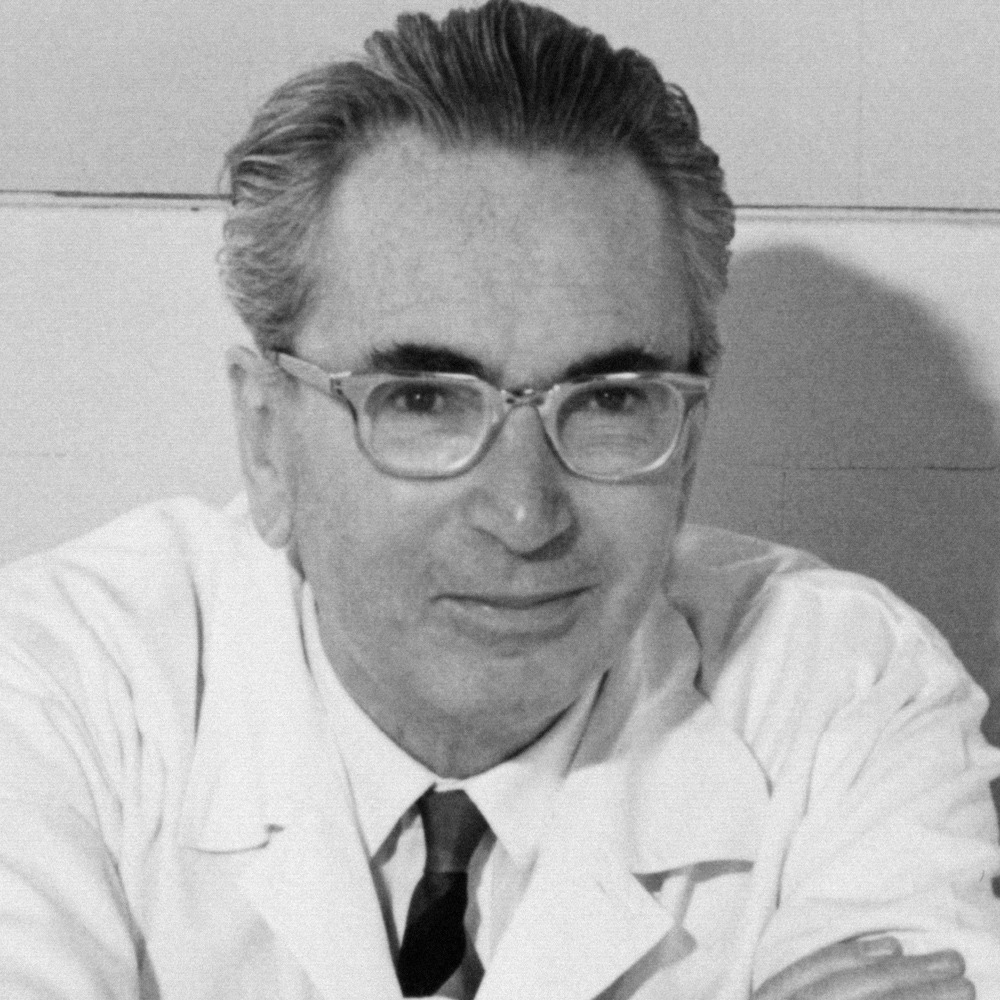- Surname:
- Frankl
- First name:
- Viktor Emil
- Era:
- 20th century
- Field of expertise:
- Psychiatry
Psychotherapy
Philosophy - Place of birth:
- Wien (AUT)
- * 26.03.1905
- † 02.09.1997

Frankl, Viktor Emil
Austrian neurologist and psychiatrist, founder of logotherapy and existential analysis.
Viktor Emil Frankl (1905–1997) was born in Vienna as the second child of his Jewish parents Gabriel and Elsa Frankl (née Lion). He studied medicine in Vienna where he joined Alfred Adler’s Verein für Individualpsychologie (Society for Individual Psychology) and developed an interest in the borderlands between psychotherapy and philosophy. However, in 1927, he fell out with Adler over theories on neuroses. Frankl worked in suicide prevention at the Steinhof Psychiatric Hospital in Vienna between 1933 and 1937, before starting a private practice. After the German annexation of Austria in 1938, he renounced emigration out of responsibility for his parents, although he had a visa for the USA. He joined Rothschildspital, the only hospital in Vienna still treating Jews, as head of the neurology department in 1940 and married his wife, Tilly Grosser, in 1941. In 1942, Frankl, his wife and his parents were deported to Theresienstadt concentration camp. He spent three years in four different concentration camps and lost his entire family except for one sister.
Autobiographical and scientific work
In 1946, Frankl published the report Ein Psychologe erlebt das Konzentrationslager (A Psychologist Experiences the Concentration Camp; English translation published in 1959 under the title A Man’s Search for Meaning). In this book, which was to become famous worldwide, he linked his experiences with his philosophical standpoint, emphasising that, in a concentration camp, a human being can be stripped of everything but not of “the last human freedom” to respond to the given circumstances in this way or in that way – and that there was an “in this way or in that way” (1946/2005: 95). His main work on logotherapy, Ärztliche Seelsorge (The Doctor and the Soul; 1955) also appeared in 1946. In 1947, Frankl married his second wife, Eleonore Katharina Schwindt; the couple had one daughter. Frankl is considered the founder of the “third” Vienna School; seeking to overcome both scientific “psychologism” and “sociologism”, he designed a philosophical anthropology in the tradition of Heidegger, Scheler and Jaspers as well as its practical application: existential analysis and logotherapy.
After the war, he became head of the neurology department at Vienna Polyclinic Hospital and held this position until 1970. He was awarded a professorship in neurology and psychiatry at the University of Vienna in 1955. He became known internationally and received numerous awards, visiting professorships and honorary doctorates. Yet, despite having published several genuinely psychiatric texts (1950; 1956), his influence on clinical psychiatry remained rather limited. Frankl died in 1997 in Vienna.
Since 1999, the Viktor Frankl Prize is being awarded by the City of Vienna and the Viktor Frankl Society. Viktor Frankl Museum in Vienna opened in March 2015.
Literature
Batthyány, D., O. Zsok (2005; eds.): Viktor Frankl und die Philosophie. New York, Vienna: Springer.
Frankl, V. (1946): Ärztliche Seelsorge. Grundlagen der Logotherapie und Existenzanalyse. Vienna: Deuticke.
Frankl, V. (1946b): Ein Psychologe erlebt das Konzentrationslager. Vienna: Verlag für Leben und Volk.
Frankl, V. (1947): Die Psychotherapie in der Praxis. Eine kasuistische Einführung für Ärzte. Vienna: Deuticke.
Frankl V. E. (1950): Manisch-depressive Phasen nach Schädeltrauma. In: Monatsschrift für Psychiatrie und Neurologie 119 (5), pp. 307–311.
Frankl, V. E. (1956): Person und Psychose. In: Jahrbuch für Psychologie und Psychotherapie 4, pp. 40–55.
Frankl, V. E. (1956): Theorie und Therapie der Neurosen. Vienna: Urban & Schwarzenberg.
Frankl, V. E. (1958): Kritische Bemerkungen zum analytischen Psychologismus. In: Jahrbuch für Psychologie und Psychotherapie 6, pp. 224–239.
Frankl, V.E. (1984): Logotherapy. In: R. J. Corsini (ed.): Encyclopedia of Psychology. New York: Wiley, pp. 319–320.
Frankl, V. E. (2005): … trotzdem Ja zum Leben sagen. Und ausgewählte Briefe, 1945–1949. (Collected Works, Vol. 1; edited by A. Batthyany, K. Biller, E. Fizzotti). Vienna, Cologne, Weimar: Böhlau.
Frankl, V. E. (2006): Psychologie des Konzentrationslagers. Synchronisation in Birkenwald. Und ausgewählte Texte 1945–1993. (Collected Works, Vol. 2; edited by A. Batthyany, K. Biller, E. Fizzotti). Vienna, Cologne, Weimar: Böhlau.
Frankl, V. E. (2008): Die Psychotherapie in der Praxis. Und ausgewählte Texte über angewandte Psychotherapie. (Collected Works, Vol. 3; edited by A. Batthyany, K. Biller, E. Fizzotti). Vienna, Cologne, Weimar: Böhlau.
Frankl, V. E. (2011): Ärztliche Seelsorge. Grundlagen der Logotherapie und Existenzanalyse. (Collected Works, Vol. 4; edited by A. Batthyany, K. Biller, E. Fizzotti). Vienna, Cologne, Weimar: Böhlau.
Frankl, V. (1961): Psychologie und Psychiatrie des Konzentrationslagers. In: H. W. Gruhle, R. Jung, W. Mayer-Gross, M. Müller: Psychiatrie der Gegenwart. Vol. 3: Soziale und angewandte Psychiatrie. pp. 743–759.
Klingberg Jr., H. (2013): Viktor und Elly Frankl. Die Geschichte zweier außergewöhnlicher Menschen. Vienna: Facultas.
Riemeyer, J. (2007): Die Logotherapie Viktor Frankls und ihre Weiterentwicklungen. Eine Einführung in die sinnorientierte Psychotherapie. Bern: Hogrefe.
Rohr, W. (2009): Viktor E. Frankls Begriff des Logos. Die Sonderstellung des Sinnes in Substanz- und Relationsontologie. Munich: Alber.
Ansgar Fabri, Burkhart Brückner
Photograph: Prof. Dr. Franz Vesely / Source: Wikimedia / Lizenz: CC BY-SA 3.0
Referencing format
Ansgar Fabri, Burkhart Brückner (2015):
Frankl, Viktor Emil.
In: Biographisches Archiv der Psychiatrie.
URL:
biapsy.de/index.php/en/9-biographien-a-z/302-frankl-viktor-emil-e
(retrieved on:30.08.2025)
